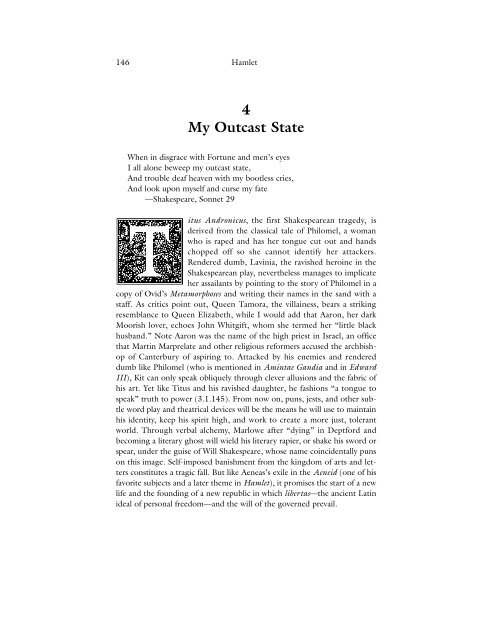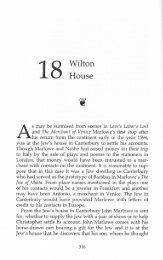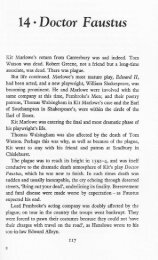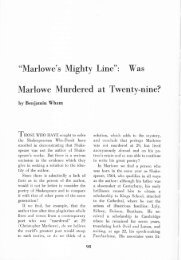Page 113-180 Shakespeare - The Marlowe Studies
Page 113-180 Shakespeare - The Marlowe Studies
Page 113-180 Shakespeare - The Marlowe Studies
Create successful ePaper yourself
Turn your PDF publications into a flip-book with our unique Google optimized e-Paper software.
146 Hamlet4My Outcast StateWhen in disgrace with Fortune and men’s eyesI all alone beweep my outcast state,And trouble deaf heaven with my bootless cries,And look upon myself and curse my fate—<strong>Shakespeare</strong>, Sonnet 29itus Andronicus, the first <strong>Shakespeare</strong>an tragedy, isderived from the classical tale of Philomel, a womanwho is raped and has her tongue cut out and handschopped off so she cannot identify her attackers.Rendered dumb, Lavinia, the ravished heroine in the<strong>Shakespeare</strong>an play, nevertheless manages to implicateher assailants by pointing to the story of Philomel in acopy of Ovid’s Metamorphoses and writing their names in the sand with astaff. As critics point out, Queen Tamora, the villainess, bears a strikingresemblance to Queen Elizabeth, while I would add that Aaron, her darkMoorish lover, echoes John Whitgift, whom she termed her “little blackhusband.” Note Aaron was the name of the high priest in Israel, an officethat Martin Marprelate and other religious reformers accused the archbishopof Canterbury of aspiring to. Attacked by his enemies and rendereddumb like Philomel (who is mentioned in Amintae Gandia and in EdwardIII), Kit can only speak obliquely through clever allusions and the fabric ofhis art. Yet like Titus and his ravished daughter, he fashions “a tongue tospeak” truth to power (3.1.145). From now on, puns, jests, and other subtleword play and theatrical devices will be the means he will use to maintainhis identity, keep his spirit high, and work to create a more just, tolerantworld. Through verbal alchemy, <strong>Marlowe</strong> after “dying” in Deptford andbecoming a literary ghost will wield his literary rapier, or shake his sword orspear, under the guise of Will <strong>Shakespeare</strong>, whose name coincidentally punson this image. Self-imposed banishment from the kingdom of arts and lettersconstitutes a tragic fall. But like Aeneas’s exile in the Aeneid (one of hisfavorite subjects and a later theme in Hamlet), it promises the start of a newlife and the founding of a new republic in which libertas—the ancient Latinideal of personal freedom—and the will of the governed prevail.






